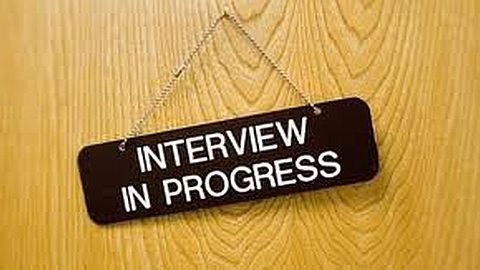Ten Job Interview Myths Debunked

Not so, says David Couper, a Los Angeles career and executive coach and the author of Outsiders on the Inside: How to Create a Winning Career … Even When You Don’t Fit In. In reality, most interviewers are ill-prepared and distracted, he says. “They usually just wing it based on their own experience.”
1. The interviewer is prepared.
The person interviewing you is likely harried and overworked, because he needs to hire someone. He may have barely glanced at your résumé and given no thought to your qualifications.
2. The interviewer asks good questions.
Many interviewers prepare no questions in advance beyond "Tell me about yourself." "They usually just wing it," says Couper.
3. They want you to accept their offer of refreshment.
Interviewers feel obliged to be polite and offer you a drink, but they do not really want to go fetch that cup of tea.
4. The interviewer wants additional materials like references.
Unless you're a designer or writer, the interviewer does not want you to hand over reports or reference materials.
5. There's a right answer to an interviewer's question.
When you're asked a tough question, the interviewer is usually more interested in seeing how you go about addressing it than in precisely what you end up saying.
6. You should keep your answers short.
The interviewer doesn't want to have to think of another question to ask you. "If you're giving information that's hitting what they need to know, then they're happy," says Couper.
7. Hiring managers value skills over physical attractiveness.
There's a lot of research that demonstrates that looks do matter, Couper says. What should an unattractive job seeker do? "Plastic surgery," he deadpans.
8. When they ask where you want to be in five years, they want you to demonstrate ambition.
What they really want: your willingness to toil away at the same job happily and indefinitely.
9. If you're invited to an interview, the job is still open.
Frequently hiring managers just go through the motions of interviewing candidates after having picked an inside applicant or someone with a personal connection to the company.
10. The most qualified person gets the job.
Couper himself says he's hired less qualified but friendlier applicants over more talented job seekers who seemed they might be difficult to get along with.
Before he became a consultant and coach, Couper worked in human resources and training at several big companies in Chicago and Los Angeles, including the now-defunct consulting giant Arthur Andersen. He has sat in the interviewer’s chair many times.
At one interview of a potential sales staffer, Couper was called in at the last minute because another human resources manager had canceled and three bodies were required at the interview table. “I hadn’t seen the applicant’s résumé,” he recalls. “I didn’t even know what the job was.”
Another time Couper was in the job seeker’s chair, and he thought the hiring manager seemed a little strange–especially when he said, “I see you got your degree in Cleveland.” Couper realized the interviewer was looking at someone else’s résumé.
Even when they know who you are, interviewers rarely ask good questions, says Couper. The most frequent–tell me about yourself–is among the silliest, he points out, because it’s too general. “Interviewers are looking for someone who can do the job, fit in with the culture, and not cause trouble,” he says. “If you can demonstrate that you can do that, you will get the job.” His advice: Don’t tell the interviewer about yourself. Talk about what you would accomplish in the position you want, and specify ways your past successes illustrate that.
Interviewers feel obligated to offer job seekers refreshment, but Couper says they don’t really want you to say yes to that cup of coffee. Couper recalls an interviewee accepting his offer of a cup of tea. “I had to find a cup, I had to find some tea, I wasted, like, half an hour, and got really annoyed,” he recalls. “Unless there’s a bottle of water sitting there and they offer it, just say, ‘No thanks, I’m fine.’”
Most career manuals advise job seekers to make their answers succinct. Couper says this is not necessarily a winning strategy. Because most interviewers haven’t thought about what to ask you, you can make a favorable impression by going on for awhile with convincing reasons you’d make a great hire. “If you’re giving information that’s hitting what they need to know, then they’re happy,” Couper says.
Perhaps the biggest interview myth, according to Couper, is that the most qualified applicant gets the job. Frequently, it’s the applicant who comes recommended from an inside source or a personal connection, like when the boss’s brother-in-law gets hired whether or not he’s the smartest or most accomplished candidate. The final determination can also come down to personality rather than qualifications.
Couper recalls a time he had to hire actors to perform in training videos for a large corporation. He didn’t always hire the most skilled applicants. “There were actors who did a great job performing, but you could tell they would be difficult people,” he says. “You say to yourself, he seems really talented, but I’ll have to socialize with him.” Couper says he often went for a less talented but friendlier candidate.





